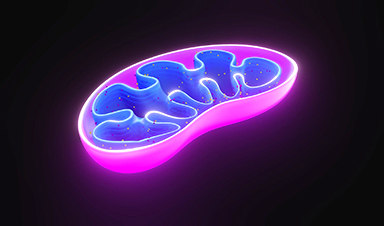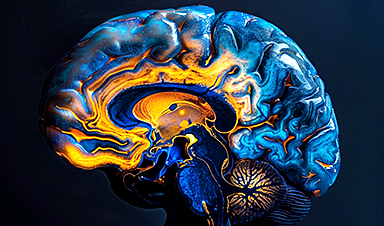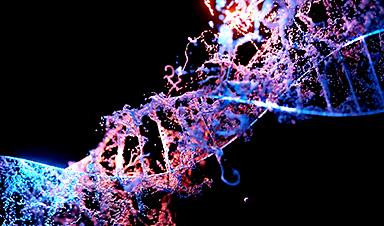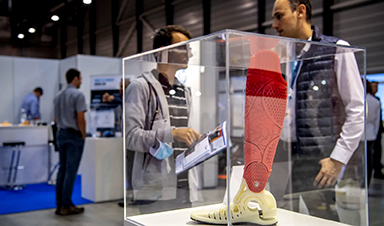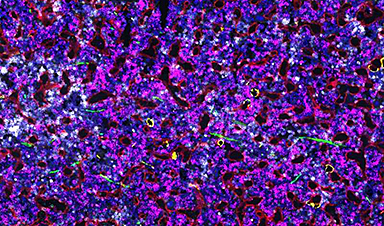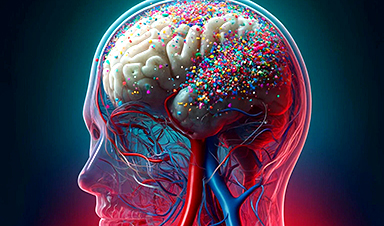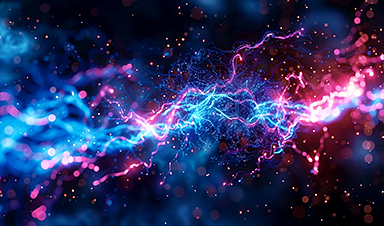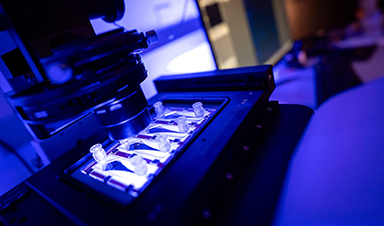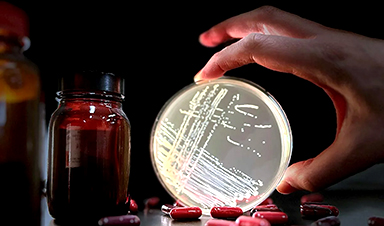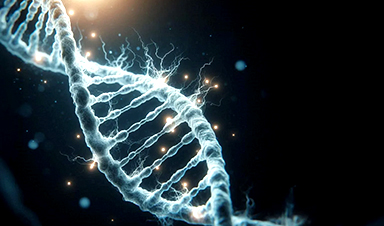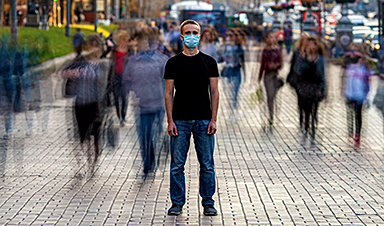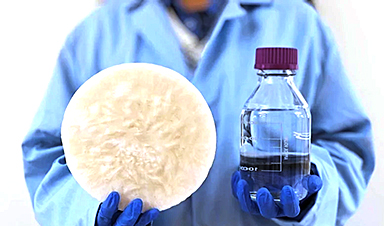Compartmentalization is one of the main strategies by which nature allows for control over many biological processes. For the proper functioning of living cells, organelles, small compartments within the cell, are essential. Researchers are working on ways to make artificial organelles that add new functionalities to cells or correct dysfunctional processes in cells, for example as a therapy for metabolic diseases. This can be achieved by using synthetic components to produce artificial organelles outside the cell or by using components made in the cell. And it’s the latter approach that Suzanne Timmermans explored for her Ph.D. research through the use of protein nanoparticles.
For her Ph.D. research, Suzanne Timmermans used protein nanoparticle to develop artificial organelles that could do new jobs in the cell. These microscopic particles are composed of viral capsids (the protein shells of viruses) to which a stabilizing protein domain was added.
Timmermans demonstrated that the nanoparticles are stable over prolonged times under conditions that are comparable to those inside cells. This is crucial for the correct functioning of an artificial organelle, as it would be very destructive if it were to disintegrate and lose its function inside the cell. In addition, the stabilizing domains enable the nanoparticles to react to their environment by changing their size. The natural processes in the cell often demonstrate such responsive behavior, so it is very important to mimic this.
Active component
To have a particular function in the cell, an artificial organelle must contain an active component. Enzymes are excellent candidates, as these protein catalysts can be produced by cells, they are naturally active inside cells, and many enzymes with all kinds of functionalities are known.
The protein nanoparticles used by Timmermans consist of an empty core. She demonstrated that it is feasible to encapsulate enzymes in that core. This was achieved both outside of cells and within living cells. Specifically, the latter finding is very promising for the development of an artificial organelle.
Beneficial effect on and inside cells
Finally, Timmermans evaluated whether the artificial organelles have a beneficial effect on and inside cells. First, she employed the activity of the encapsulated enzymes for the production of a compound that could be used by the cell to produce a certain protein. Next, she evaluated whether encapsulation inside the artificial organelle could protect the enzyme from rapid degradation by so-called proteases. This aspect of the project proved very challenging to prove, and this project is still in development.
Altogether, Timmermans’s research has advanced knowledge on the development of artificial organelles that are produced inside cells. Important challenges that still have to be overcome are the realization of the activity of the artificial organelles inside cells, the regulation of this activity by specific signals, and the detection of the organelles inside cells. By collaborating with different scientific disciplines and by employing the developments that have been made with other protein nanoparticles, Timmermans hopes that these hurdles can be overcome in the future.
News
Researchers Reveal What Happens to Your Brain When You Don’t Get Enough Sleep
What if poor sleep was doing more than just making you tired? Researchers have discovered that disrupted sleep in older adults interferes with the brain’s ability to clean out waste, leading to memory problems [...]
How to prevent chronic inflammation from zombie-like cells that accumulate with age
In humans and other multicellular organisms, cells multiply. This defining feature allows embryos to grow into adulthood, and enables the healing of the many bumps, bruises and scrapes along the way. Certain factors can [...]
Breakthrough for long Covid patients who lost sense of smell
A breakthrough nasal surgery has restored the sense of smell for a dozen long Covid patients. Experts at University College London Hospitals NHS Foundation Trust successfully employed a technique typically used for correcting blocked nasal passages, [...]
Scientists Invent Plastic That Can Dissolve In Seawater In Just A Few Hours
Plastic waste and pollution in the sea have been among the most serious environmental problems for decades, causing immense damage to marine life and ecosystems. However, a breakthrough discovery may offer a game-changing solution. [...]
Muscles from the 3D printer
Swiss researchers have developed a method for printing artificial muscles out of silicone. In the future, these could be used on both humans and robots. Swiss researchers have succeeded in printing artificial muscles out [...]
Beneficial genetic changes observed in regular blood donors
Researchers at the Francis Crick Institute have identified genetic changes in blood stem cells from frequent blood donors that support the production of new, non-cancerous cells. Understanding the differences in the mutations that accumulate [...]
Shocking Amounts of Microplastics in the Brain – It Could Be Increasing Our Risk of Dementia
The brain has higher concentrations of plastic particles compared to other organs, with increased levels found in dementia patients. In a comprehensive commentary published in Brain Medicine, researchers highlight alarming new evidence of microplastic accumulation [...]
Baffling Scientists for Centuries: New Study Unravels Mystery of Static Electricity
ISTA physicists demonstrate that contact electrification depends on the contact history of materials. For centuries, static electricity has intrigued and perplexed scientists. Now, researchers from the Waitukaitis group at the Institute of Science and [...]
Tumor “Stickiness” – Scientists Develop Potential New Way To Predict Cancer’s Spread
UC San Diego researchers have developed a device that predicts breast cancer aggressiveness by measuring tumor cell adhesion. Weakly adherent cells indicate a higher risk of metastasis, especially in early-stage DCIS. This innovation could [...]
Scientists Just Watched Atoms Move for the First Time Using AI
Scientists have developed a groundbreaking AI-driven technique that reveals the hidden movements of nanoparticles, essential in materials science, pharmaceuticals, and electronics. By integrating artificial intelligence with electron microscopy, researchers can now visualize atomic-level changes that were [...]
Scientists Sound Alarm: “Safe” Antibiotic Has Led to an Almost Untreatable Superbug
A recent study reveals that an antibiotic used for liver disease patients may increase their risk of contracting a dangerous superbug. An international team of researchers has discovered that rifaximin, a commonly prescribed antibiotic [...]
Scientists Discover Natural Compound That Stops Cancer Progression
A discovery led by OHSU was made possible by years of study conducted by University of Portland undergraduates. Scientists have discovered a natural compound that can halt a key process involved in the progression [...]
Scientists Just Discovered an RNA That Repairs DNA Damage – And It’s a Game-Changer
Our DNA is constantly under threat — from cell division errors to external factors like sunlight and smoking. Fortunately, cells have intricate repair mechanisms to counteract this damage. Scientists have uncovered a surprising role played by [...]
What Scientists Just Discovered About COVID-19’s Hidden Death Toll
COVID-19 didn’t just claim lives directly—it reshaped mortality patterns worldwide. A major international study found that life expectancy plummeted across most of the 24 analyzed countries, with additional deaths from cardiovascular disease, substance abuse, and mental [...]
Self-Propelled Nanoparticles Improve Immunotherapy for Non-Invasive Bladder Cancer
A study led by Pohang University of Science and Technology (POSTECH) and the Institute for Bioengineering of Catalonia (IBEC) in South Korea details the creation of urea-powered nanomotors that enhance immunotherapy for bladder cancer. The nanomotors [...]
Scientists Develop New System That Produces Drinking Water From Thin Air
UT Austin researchers have developed a biodegradable, biomass-based hydrogel that efficiently extracts drinkable water from the air, offering a scalable, sustainable solution for water access in off-grid communities, emergency relief, and agriculture. Discarded food [...]
